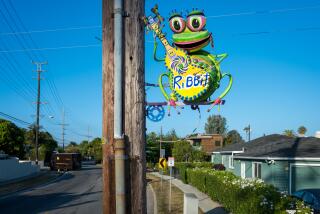The Guy Across the Street
- Share via
I had a neighbor once who complained that our cat made too much noise at night. It was not a cat that yowled in heat or fought loud battles but one that meowed occasionally for reasons of its own, the way cats do.
The guy said he couldn’t sleep because the cat’s meow was so loud. I said I couldn’t believe that a random meow was enough to keep anyone awake but he said it was. I said, “Does purring bother you?” and he said, “Sometimes.”
It was strange because there were dogs in the neighborhood that barked, helicopters that flew overhead and married couples who communicated by yelling and fist fighting, but none of that seemed to faze the guy.
“The only thing we can do,” I said in intended sarcasm, “is to remove the cat’s tongue.” He shrugged as though that would be OK with him. But then he moved. The cat kept its tongue.
I mention this to illustrate that there is always something to bother someone. Neighborhoods are constituted that way. There is always a Guy Across the Street who, like the meow man, has a heightened sensitivity to sounds. Ed Lowers, for instance, has someone like that in the vicinity of his Baldwin Park home who wants him to get rid of his rooster and five chickens.
That someone, and Ed doesn’t know who, claims the cock-a-doodle-dooing and the cluck-cluck-cluck-
ing are driving him nuts. So the city stepped in and said in so many words that they were coming for Ed’s chickens. Ed said: “Over my dead body.” I think he meant it.
*
Ed is 85 years old, slightly hunched and suffering from heart disease, but is still as tough as rawhide. No one, he says with steel in his voice, is going to take away his chickens. I believe him.
Some time back, a cat made the mistake of going after the goldfish in Ed’s pond and, as Ed put it: “The cat is now fertilizer.” I didn’t want to know any more.
He has lived in San Gabriel Valley’s Baldwin Park since 1953, which was three years before the place was incorporated, and has had chickens right along. When the city started making laws to annoy its citizens, as cities will, it deemed that roosters were forbidden except in meat markets, and that no one could have more than three chickens, except in stews and fricassees.
The law supposedly exempted those who already had roosters and chickens, so Ed went on gathering eggs. He raised a family, grew a garden, built a hothouse and a pond with a waterfall, retired from house painting and prepared to live a peaceful life with his wife of 57 years.
Then one day a “corporal” from the city, as Ed calls him, came by with an official notice that said he had to get rid of the rooster and two of his five chickens “to prevent further action.” The Guy Across the Street in every neighborhood had complained.
Ed looked at the corporal the way he must have looked at the cat before the animal became fertilizer and said the chickens, all of them, would stay.
*
Because Ed wrote and telephoned just about everyone he could think of, his situation came to the attention of radio, television, a local newspaper and community activist Shirley Hanson, who is to municipal government what NATO is to Slobodan Milosevic.
I have seen her battle idiocies in Temple City and La Puente on behalf of anyone she feels is being kicked around. While she doesn’t always win, she always leaves a mark on City Hall that is faintly reminiscent of handprints on a bureaucrat’s throat.
The upshot of all this was that Ed says he was told by Mayor Manuel Lozano not to worry about it, things would work out all right. Ed has taken that to mean he is able to keep his rooster and all of his chickens.
“The corporals make more noise than the generals,” he said with a wave of his hand as we walked through his garden, past rows of tomatoes, rhubarb, onions and peppers, nibbling on boysenberries as sweet as sunlight.
He led me past cactus plants that towered over us both, near tall plum trees he’d planted himself, through an arbor that shielded exotic ferns and a hothouse he’d built with odds and ends of glass and wood. It was a garden hidden from time, a corner of the past enclosed by Ed’s caring hands.
“They had a cow across the street in the old days,” he said. “Everybody had chickens. But all that’s gone.”
The rooster only crowed once when I was there and the hens didn’t cluck at all. One hopes that the city will follow their wise examples and quietly leave Ed to his small paradise. He doesn’t need more fertilizer.
*
Al Martinez’s column appears Sundays and Wednesdays. He can be reached online at al.martinez@latimes.com)
More to Read
Sign up for Essential California
The most important California stories and recommendations in your inbox every morning.
You may occasionally receive promotional content from the Los Angeles Times.










